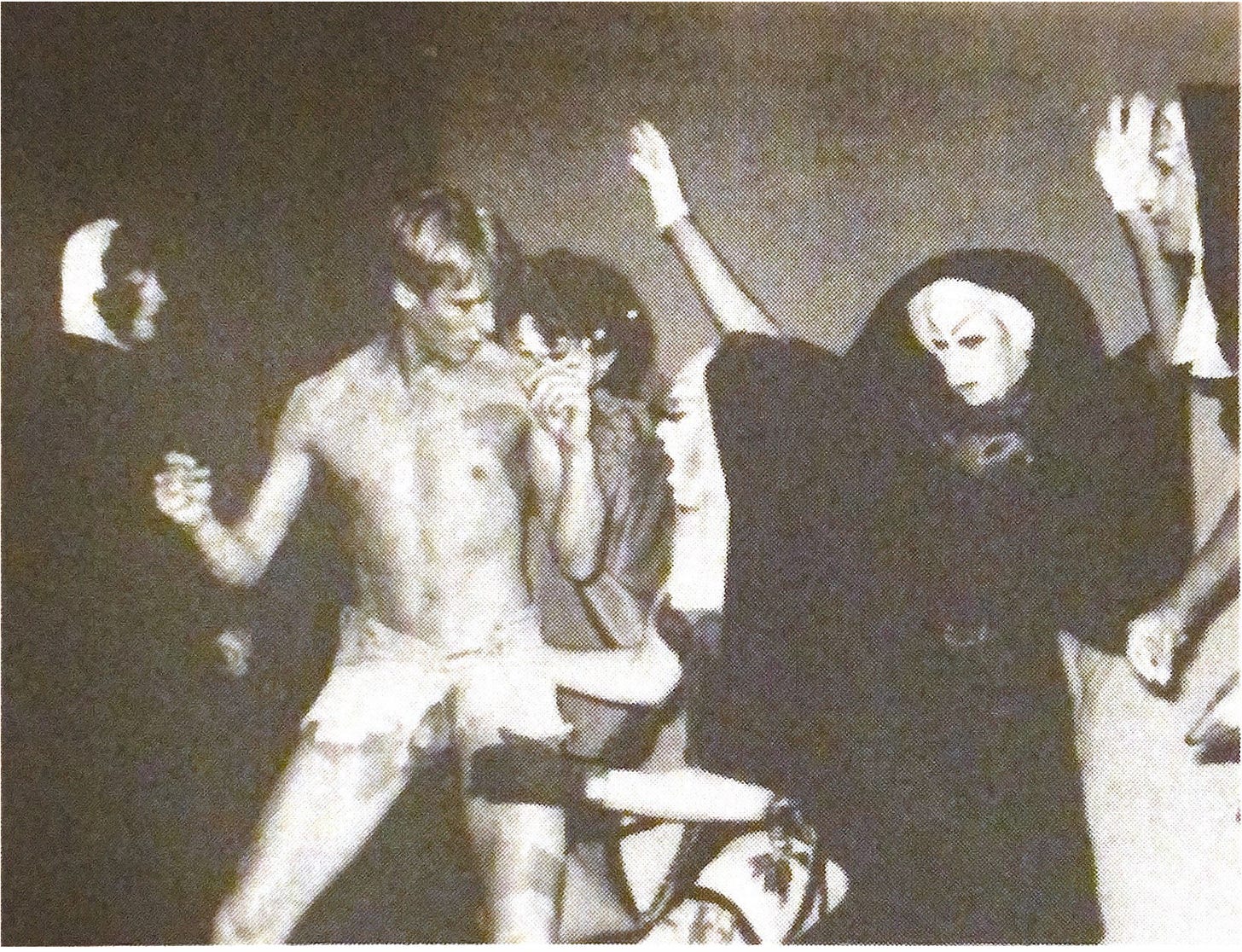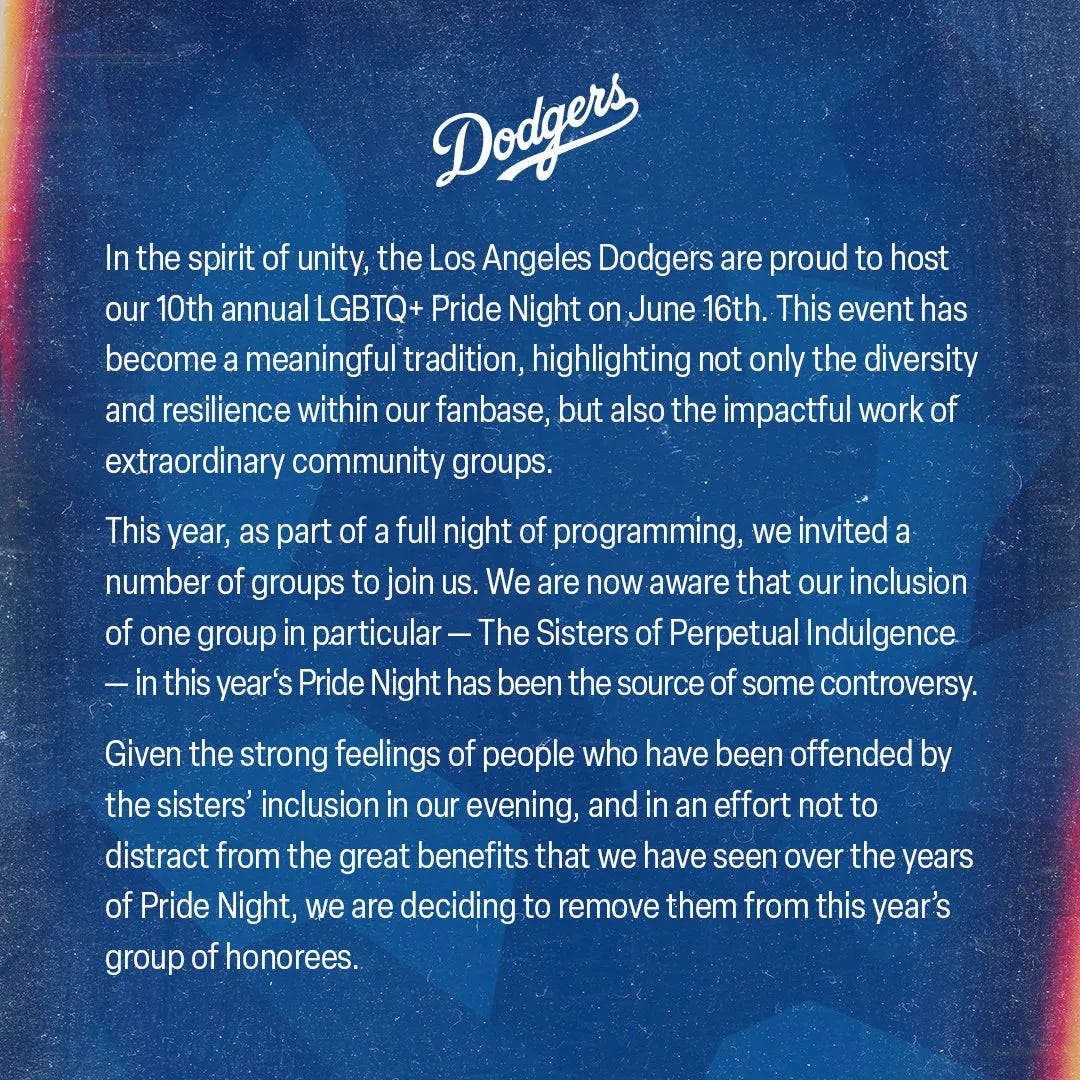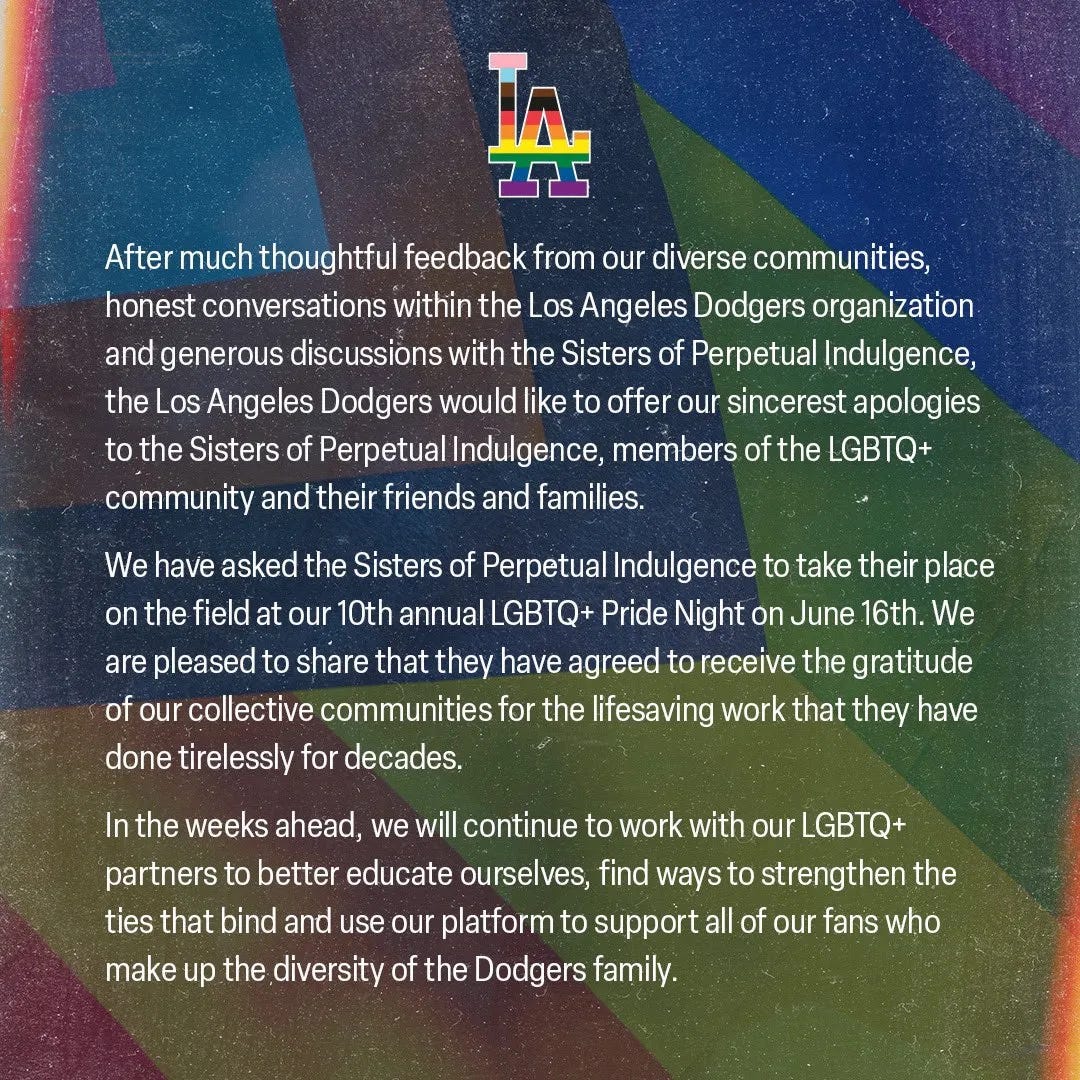Corporations Are Not Coming to Save Us
As Pride Month looms, I dive deep into the LA Dodgers' latest scandal
Last week, for the first time in my life, I became incensed over a sports team. As someone who’s never been a big fan of sports, I have always found it intriguing, and, at times, humorous, that people allow something as superfluous as sports to inspire rage within them. However, I gained a new understanding of sports fans as the Los Angeles Dodgers became the target of my ire. My grievance, though, was not caused by the performance of the team in a given game; instead, I was deeply upset by the Dodgers’ decision to disinvite the LA Chapter of the Sisters of Perpetual Indulgence from receiving the Community Hero Award at their annual Pride Night.
I first became aware of the Sisters in 2016. It was at the height of the WOWPresents YouTube channel, and two sisters, Sister Roma and Sister Bearonce, were featured in the series BE$TIE$ FOR CA$H. The first aspect of sisters that struck me was, very intentionally, their makeup. Sisters appear with a base done in stark white makeup before adding ornamentation in their own individual style. While Sister Bearonce had a neon green glitter-beard and beautifully blended shades of green and yellow contouring her face, Sister Roma’s makeup was much more simple; a white face with a purple neon crease just below her eyebrows. I also took note of the ornate headwear adorned by each of the sisters. Sister Roma had used a purple boa to create a semaphore of hair cascading from her head, and Sister Bearonce wore something more akin to a nun’s habit, but if a nun’s habit had a baby with a cowboy hat. I had never seen drag artists dress this way, and I found it fascinating.
This perversion of the Roman Catholic nun aesthetic has been a part of the organization throughout the entirety of their history. Founded in San Francisco in 1979, the Sisters of Perpetual Indulgence are a human-rights organization with the aim to “promulgate universal joy and expiate stigmatic guilt.”1 Put another way by the Sisters’ LA Chapter, they “make people happy, stamp out guilt brought on by a judgmental society and help various organizations and charities.”2 The Sisters, which was started by three bored gay men who decided to dress up as nuns and run around the city, realized the power that appearing in habit brought them; they soon began to leverage that power to do good for a variety of marginalized communities. They appeared for the first time as an organization at a protest over the Three Mile Island disaster and, soon after, their first fundraising event benefitted Cuban refugees. The organization, being in its nascent years during the beginning of the U.S. HIV/AIDS Crisis, also published a pamphlet called “Play Fair!” The pamphlet, unlike its more bureaucratic predecessors, was written by members of San Francisco’s queer community, meaning that it was much more accessible to the communities most impacted by HIV/AIDS at the time.
Another unique aspect of the Sisters’ activism is the humor with which they approach their work. In fact, one of the first demonstrations that garnered attention for the Sisters was a pom pom routine; the routine was so popular that they even performed it as a part of their participation in that aforementioned Three Mile Island protest. Even in that video that introduced me to the Sisters, when asked what Sister Bearonce was “hiding under [her] wimple,” Sister Roma simply wrote “AIDS.” In reply, a shocked Sister Bearonce says, “it’s funny, kind of, for some people, but it’s mostly horrible,” an assessment I’m in near complete agreement with. While the joke is certainly shocking, I find it consistent with the activism that I’ve been characterizing. As someone who’s done extensive research on the HIV/AIDS Crisis, there’s no shortage of seriousness in HIV/AIDS activism (responses by governmental institutions, however, are a completely different story). Contrasting that seriousness within the movement, Sister Roma’s approach, to borrow a phrase from the British, takes the piss out of HIV/AIDS. Though it’s a life-threatening condition, and still a very real threat to our community, Sister Roma, by approaching such a serious situation with humor, makes it seem less scary. She takes some of the power away from the disease. This irreverence is central to the Sisters’ activism. As an organization, they show that you can experience joy amidst the world’s various crises and still have a tangible impact without taking yourself too seriously.

Why, then, were the Sisters disinvited from the Dodgers’ Pride Night? In the disinvitation, the Dodgers cited “the strong feelings of people who have been offended by the sisters’ inclusion in our evening” as adequate reasoning. Most of these strong feelings came from Catholic individuals and organizations who take issue with the Sisters’ appropriation of Catholic imagery and language in their activism.
The complaint that gained the most attention, of course, came from former presidential hopeful, current presidential hopeless, and all-around perennial blowhard, Senator Marco Rubio. In a letter addressed to MLB Commissioner Robert Manfred, Rubio writes “to ask whether [Manfred’s] League wants to be ‘inclusive and welcoming’ to Christians, and if so, why [he is] allowing an MLB team to honor a group that mocks Christians through diabolical parodies of our faith.”3 Rubio clearly did not do his research into the Sisters. If he had, he would have seen the positive impact they’ve been able to leave over their history and, being a good Catholic who's clearly committed to social justice and charity, understood why the Dodgers would want to award the organization. Or, more likely, he’s so blinded by his utter contempt for queer people that, no matter how much good the Sisters have done over their history, he was always going to oppose their presence at Pride Night. Refuting critiques like that of Rubio, Sister Unity, a member of the Sisters’ LA Chapter, told NBC News 4, “we do not intentionally mock Catholicism… to mock Catholics would be to mock people, and we’re here to uplift people.”4 While I’m no fan of Rubio, I can understand his confusion. Even a cursory look at his career as a public servant would show you that, unlike the Sisters, he has no idea how to keep a consistent ideological position.
However misguided the criticism levied against the Sisters was, it did not stop the Dodgers from completely capitulating to it and disinviting the Sisters. And, for me, it was a complete mask-off moment. By disinviting an organization like the Sisters, with a long and storied history of queer activism that tangibly benefits actual queer communities, the Dodgers showed how hollow so-called “corporate allyship” usually is. If you cannot award an organization like the Sisters as “Community Heroes,” who, then, is worthy of the award? The Dodgers wanted the optics and the accolades that come along with having a Pride Night, but, when the going got tough, they weren’t interested in supporting the LGBT+ individuals and organizations they claim to champion.
The Dodgers are not the only corporation in recent memory to backpedal their support for the LGBT+ community. Back in April, brewing giant Anheuser-Busch faced a similar backlash after partnering with transgender influencer Dylan Mulvaney. The backlash from conservatives was immediate and intense, reaching a really strange fever pitch when has-been musician Kid Rock posted a video of himself shooting through cases of Bud Light with an assault rifle.
Additionally, in the past week, Target announced the removal of certain items from their 2023 pride collection, citing the “threats impacting our team members’ sense of safety and well-being while at work”.5 These corporations illustrate that, despite their claims to care deeply, they only care about those issues facing LGBT+ communities insofar as they don’t affect the main goal of the corporation: profit. These corporations are happy to make a rainbow version of their logo and manufacture special t-shirts with said logo for mass consumption, but, when it comes to defending actual LGBT+ individuals and organizations, they often fold at the first sign of backlash. This approach worked fine when there was some modicum of tacit acceptance for LGBT+ people in the U.S. We are no longer in that moment. In the legacy of Joseph McCarthy before them, many elected officials, like Marco Rubio and Ron DeSantis, take every opportunity to architect a harder life for queer individuals in the absence of a larger ideological project. As a result, LGBT+ communities face a host of hostile pieces of legislation across the country. History repeats itself as, once again, by the act of merely existing, LGBT+ people are inaccurately and unjustly being conflated with pedophiles and groomers. Therefore, the LA Dodgers, or Anheuser-Busch, or Target simply seeing us as a new demographic group to market products to is no longer enough. In fact, it never was.
This critique is nothing new. In the past few years, the thought that corporations are more interested in their profit margins than liberation has become mainstream. Why, then, do people care about Pride Night? Or Target selling tuck-friendly bathing suits? If we all know that these corporations are trying to turn a profit, why do conservatives become outraged by the existence of these products, and why are LGBT+ people upset about the occasional withdrawal of a support that was inauthentic anyway?
In Evan Ross Katz’s write-up about the Dodgers disinvitation of the Sisters of Perpetual Indulgence, he identified a potential answer to my question. Katz wrote about how, to queer fans, who tend to feel alienated from sports like baseball, a team’s statement of values can be incredibly important. In a quote included in Katz’s piece, columnist Hemal Jhaveri argues, “a ‘Pride Night’ is a great first step for an organization to put forward a clean message to all fans of the team that says, ‘Everyone is welcome in this building. This is what we stand for as a team. This is what we stand for as players.’”6 I agree with Jhaveri’s assessment. I, myself, have done extensive research into a company’s values before supporting them monetarily. It’s the reason I like to buy Veja sneakers; they might be double or triple the price of their competitors, but they’re also the only sneaker brand I can find that discloses their labor practices. This day in age, myself and others want the companies we support to share and represent our values. But, why is this? Why is it that we look to corporations for such statements of value?
I cited a Gallup poll near the end of last week’s newsletter. The poll indicated that a growing number of people are losing faith in US institutions. In that particular poll, just seven percent of respondents indicated that they had a “great deal” or “quite a lot” of trust in Congress.7 The least trusted institution in the US is the same institution responsible for representing us. We live in a democratic republic, meaning we elect these representatives to go to Washington DC, advocate for our values in Congress, and enact the change we want to see in our nation. However, what happens when our values are not being represented? What happens when we see issues like gun violence and climate change, among myriad others, persist while our representatives in Congress seemingly sit idly by? It would follow that we look for another force to represent our values. Enter: corporations. As I stated earlier, LGBT+ people across the country face a renewed legislative effort to create a nation that is more hostile towards us. When our own country begins to feel inhospitable due to the actions of those people who have been elected to represent us, it’s understandable why some queer people look to organizations they love for representation, affirmation, and even protection. Therefore, the LA Dodgers, along with many other corporations, become a substitute for actual elected officials. These corporations show a willingness to listen to us, however superficial it may be, when our representatives in Congress won’t. As a result, we have so little faith in our institutions that a Pride Night at Dodgers Stadium can, somehow, feel more consequential than a piece of legislation.
While the Dodgers did eventually reinvite the Sisters, this entire situation illustrates that queer liberation will not come from corporations. Despite whichever social causes a given corporation claims to support, profit will always be that corporation’s ultimate ideology. Unfortunately, we cannot always rely on queerness to be popular or culturally acceptable, meaning that corporations will, in the interest of their respective bottom lines, withhold their support when it benefits them. Many of these corporations will also leverage their power to oppress their workers, many of whom identify as LGBT+, which is also antithetical to queer liberation. There are many other theories as to how we can liberate ourselves as queer people, and, if the LA Dodgers have taught us anything, we need to try something else than relying on corporate power.
“Sistory.” The Sisters of Perpetual Indulgence, Link: https://www.thesisters.org/sistory.
“About the Sisterhood.” Link: https://www.ladragnuns.org/.
Rubio, Marco. “Dodgers Aren’t ‘Inclusive and Welcoming’ to Christians.” 15 May 2023, Link: https://www.rubio.senate.gov/public/index.cfm/2023/5/rubio-to-mlb-dodgers-aren-t-inclusive-and-welcoming-to-christians.
“LA Archdiocese Blasts Dodgers for Renewing Pride Night Invite.” NBC Los Angeles, 23 May 2023, Link: https://www.nbclosangeles.com/local-2/la-archdiocese-blasts-dodgers-for-renewing-pride-night-invite/3158786/.
“Target Statement on 2023 Pride Collection,”Target, 24 May 2023, Link: https://corporate.target.com/press/releases/2023/05/Target-Statement-on-2023-Pride-Collection#:~:text=Our%20focus%20now%20is%20on,Month%20and%20throughout%20the%20year.
Katz, Evan Ross. “F*ck the LA Dodgers.” Shut Up Evan, 22 May 2023, Link:
Jones, Jeffrey M. “Confidence in U.S. Institutions Down; Average at New Low.” Gallup, 5 July 2022. Link: https://news.gallup.com/poll/394283/confidence-institutions-down-average-new-low.aspx.







Just getting caught up on the blog, now that I'm back from Greece...
You know that Roma is one of my nearest and dearest, and I plan to share this with her. Such a well written post!